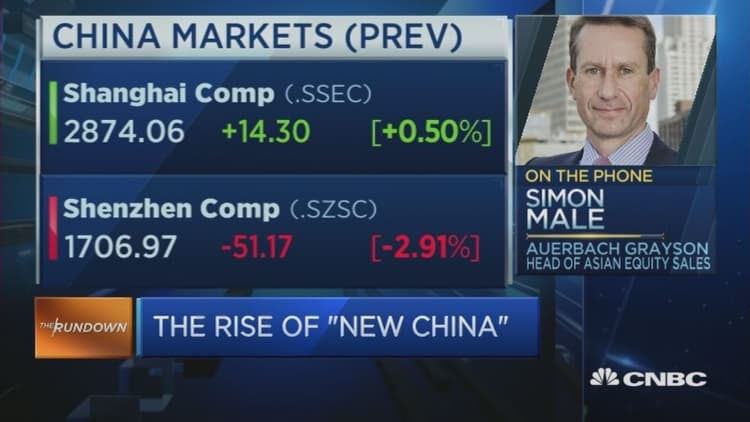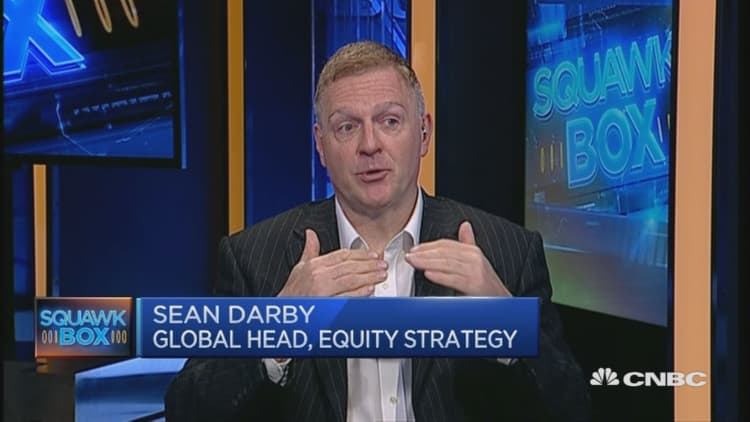




China's top brass are pledging reforms and dispelling fears of a hard landing in key national meetings that started over the weekend, underscoring Beijing's efforts to stabilize market sentiment and assert the Communist Party's leadership.
On Saturday, premier Li Keqiang announced a growth target of 6.5 to 7 percent this year at the annual National People's Congress, down from last year's "about 7 percent" while the head of the National Development and Reform Commission, Xu Shaoshi, said that the country will "absolutely not experience a hard landing".
The pledges come amid concerns about the state of the world's second-largest economy and Beijing's ability to manage its own economic transition, which emerged as key discussion points at the finance ministers and central bankers meetings in Shanghai last month.
The 'relatively high' growth forecast suggests policymakers will relax fiscal targets to support the economy although the pace of structural reforms should be slow, Morgan Stanley economists said in a note.
China is struggling to cope with the transition from a manufacturing-led to a consumer- and services-led economy. Economic growth in 2015 was 6.9 percent, the slowest pace in quarter of a century. Many industries are saddled with inventory while financial market gyrations, including lack of clarity on China's currency policy, have also sapped confidence
Finance Minister Lou Jiwei on Monday that the 2015 budget deficit was 2.4 percent of gross domestic product (GDP), two days after the finance ministry said China had budgeted for a deficit of 3 percent of GDP in 2016 in a bid to support the economy.
Societe Generale economists, however, pointed out that the actual budget deficit in 2015 was closer to 3.5 percent of GDP. The final number for 2016 may end up printing near 4 percent of GDP.
In the run-up to the two meetings, Beijing flagged 1.8 million job losses in the country's' bloated coal and steel industries, setting the stage for a slew of announcements about economic reforms from tackling over-capacity to liberalizing foreign investment.
While China is trying to tackle supply- and investment-led issues, there are not enough details about how consumption-side growth will offset the decline in the manufacturing sector that has powered the economy for years, said BNP Paribas' chief economist for emerging markets, Richard Iley.
"The missing element is a lack of really concrete measures on policies that will explicitly boost consumption. We know that lower investment, over-capacity is half the problem…it's also got to significantly increase consumption (and) lower national savings to offset the headwinds that falling investment are necessary going to create," Iley told CNBC's "Squawk Box" on Monday.
Also challenging the country's leadership is the emergence of "many Chinas", said Simon Male, head of Asian equity sales at New York-based brokerage, Auerbach Grayson.
An increasingly complicated and diverse economy of the old and new will add to strains in the country, as old industries such as those in coal and steel stutter alongside rising stars in science and technology, which are likely to increasingly take global market share, Male told CNBC's "The Rundown".
Even so, the assurances from the country's leaders seem to have soothed some jitters.
"A lot of the fears about China a year or two ago about some sort of imminent hard landing have largely evaporated. We're realizing that China is on course for a long landing and this rebalancing is going to take a considerable period of time," said BNP's Iley.
The ongoing disarray will challenge the leadership of the Communist Party of China.
"(There is a) struggle to get the Communist Party reorganized after years of disorder, corruption…that of course makes it even more difficult for the country to adjust to the very demanding problems of the capitalist system in the world today," said Wang Gungwu, chairman of the East Asian Institute in Singapore.
Xi's major dilemma, Wang said, is that the political system he has inherited is not one based on capitalism and is tied to keeping the party in power while trying to catch up with economic development
"So the structure is really trying to catch up with the economic developments but the structure itself is based on very firm ideas about what is suitable, what is necessary necessary to keep it in power. It doesn't want to give that up because it believes strongly—right or wrong—that (the system) is the necessary thing for China if China is to continue developing," added Wang.
"They are really experimenting and trying to innovate; they are trying to create something that could cope with...the capitalist system (that) is a bit like a tiger; a tiger is very hard to ride and hard to get off."



